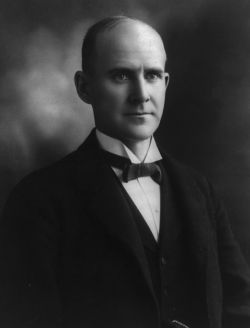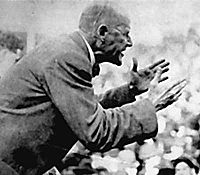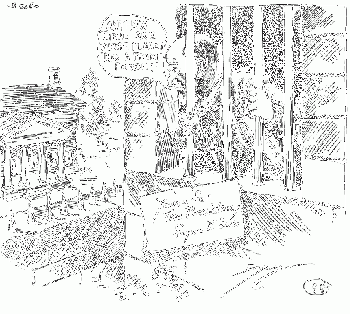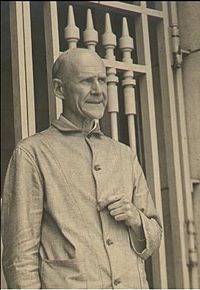Eugene V. Debs
| Eugene Victor Debs | |
 | |
| Born | November 5, 1855 Terre Haute, Indiana |
|---|---|
| Died | October 20, 1926 (aged 70) Elmhurst, Illinois |
Eugene Victor Debs (November 5, 1855 - October 20, 1926) was an American labor and political leader, one of the founders of the International Labor Union and the Industrial Workers of the World (IWW), as well as five-time Socialist Party of America candidate for President of the United States.[1] A pacifist, he was imprisoned between 1918 and 1921 for denouncing U.S. participation in World War I. His health suffered in prison but he earned the respect of fellow inmates for helping them whenever he could. Stripped of citizenship, this was restored to after his death but not until 1976, fifty years after the first appeal.[2] He hated racism, and denounced it throughout his career. Influenced by Karl Marx, he saw the struggle for fair pay and better working conditions as linked to the issue of class, an unpopular rehetoric in the United States, where it is often said that class does not exist. He was renowned for his personal integrity and sincerity.
While he failed to make the socialist movement popular in America, where his anti-capitalist rhetoric had little appeal, his contribution in organizing labor nationally as well as internationally greatly strengthened labor's ability to bargain with employers for fairer terms of employment. His courage enabled him to speak up for what he believed was right, even when he knew that by doing so he was jeopardizing his own liberty.
Rise to prominence
Eugene Debs was born to parents from Colmar, Alsace, France; he was born on November 5, 1855, and lived most of his life in Terre Haute, Indiana. His father, Jean Daniel Debs, (1820-1906) came from a prosperous family and owned a textile mill and meat market. His mother was Marguerite Marie Bettrich Debs. Eugene Debs was named after the French authors Eugene Sue and Victor Hugo.[3][4]
At the age of 17, Debs left home to work on the railroads, becoming a fireman. He returned home in 1874 to work as a grocery clerk and the next year was a founding member of a new lodge of the Brotherhood of Locomotive Firemen. He rose quickly in the Brotherhood, becoming first an assistant editor for their magazine and then the editor and Grand Secretary in 1880. At the same time, he became a prominent figure in the community and in 1884 was elected to the Indiana state legislature as a Democrat, serving one term.[5]
Eugene Debs married Kate Metzel on June 9, 1885; they had no children.[6]
The railroad brotherhoods were comparatively conservative unions, more focused on providing fellowship and services than in collective bargaining. Debs gradually became convinced of the need for a more unified and confrontational approach. After stepping down as Grand Secretary, he organized, in 1893, one of the first industrial unions in the United States, the American Railway Union (ARU). The Union successfully struck the Great Northern Railway in April 1894, winning most of its demands.
Pullman Strike
Debs was jailed later that year for his part in the Pullman Strike, which grew out of a strike by the workers who made the Pullman Company's cars and who appealed to the American Railway Union at its convention in Chicago for support to gain better working conditions and higher pay. Debs tried to persuade the ARU members who worked on the railways that the boycott was too risky, given the hostility of both the railways and the federal government, the weakness of the ARU, and the possibility that other unions would break the strike. The membership ignored his warnings and refused to handle Pullman cars or any other railroad cars attached to them, including cars containing U.S. mail.[7]
The federal government did, in fact, intervene, obtaining an injunction against the strike on the theory that the strikers had obstructed the railways by refusing to show up for work, then sending in the United States Army on the grounds that the strike was hindering the delivery of the mail. An estimated $80 million worth of property was damaged, and Debs was found guilty of interfering with the mail and sent to prison.
A Supreme Court case decision, In re Debs, later upheld the right of the federal government to issue the injunction.
Socialist leader
At the time of his arrest for mail obstruction, Debs was not a Socialist. However, while jailed, he read the works of Karl Marx. A copy of Das Kapital fell into his hands during those years and he would go on to become a stalwart of socialism.[8] After his release in 1895, he started his socialist political career. The experience radicalized Debs still further. He was a candidate for President of the United States in 1900 as a member of the Social Democratic Party. He was later the Socialist Party of America candidate for President in 1904, 1908, 1912, and 1920, the final time from prison. His 1912 showing, 6 percent of the vote, remains the all-time high for a Socialist Party candidate.[9]
Debs was, however, largely dismissive of the electoral process: he distrusted the political bargains that Victor Berger and other "Sewer Socialists" had made in winning local offices and put much more value on the organization of workers, particularly on industrial lines. Debs saw the working class as the one class to organize, educate, and emancipate itself by itself.
Socialists split with the IWW
Yet Debs was equally uncomfortable with the apolitical stance of some within the Industrial Workers of the World (IWW). He had been an early supporter of the IWW, helping to organize it in 1905, along with Daniel De León, leader of the Socialist Labor Party. But the Wobblies (as IWW members were known) had grown tired of bickering between the two socialist parties,[10] and particularly of what they viewed as opportunism by De León.[11] At their convention in 1908, the Wobblies amended the IWW constitution to emphasize industrial action, and to prohibit political action, that is, alliance with any political party, in the name of the union. De León and Debs both left the IWW in 1908.[12]
Later, the electoral wing of the Socialist Party led by Victor Berger and Morris Hillquit became irritated with speeches by Big Bill Haywood, a member of the National Executive Committee, but also a leader of the IWW.[13] In December 1911, Haywood told a Lower East Side audience at New York's Cooper Union that parliamentary Socialists were "step-at-a-time people whose every step is just a little shorter than the preceding step." It was better, Haywood said, to "elect the superintendent of some branch of industry, than to elect some congressman to the United States Congress."[14] In response, Hillquit attacked the IWW as "purely anarchistic."[15]
The Cooper Union speech was the beginning of a split between Bill Haywood and the Socialist Party.[15] The final straw came during the Lawrence textile strike when, disgusted with the decision of the elected officials in Lawrence to send police who subsequently used their clubs on children, Haywood publicly declared that "I will not vote again" until such a circumstance was rectified.[16] Haywood was purged from the National Executive Committee of the Socialist Party by passage of an amendment that focused on the direct action and sabotage tactics advocated by the IWW.[17] Eugene Debs was probably the one person who might have saved Haywood's seat.[18] In 1906, when Haywood had been on trial for his life in Idaho, Debs had described him as "the Lincoln of Labor," and called for Haywood to run against Theodore Roosevelt for president of the United States.[19] But times had changed and Debs, facing a split in the Party, chose to echo Hillquit's words, accusing the IWW of representing anarchy.[20] Debs thereafter stated that he had opposed the amendment, but once it was adopted, it should be obeyed.[21] Debs remained friendly to Haywood and the IWW after the expulsion, in spite of their perceived differences over IWW tactics.[20]
Prior to Haywood's dismissal, the Socialist Party membership had reached an all-time high of 135,000. One year later, four months after Haywood was recalled, the membership dropped to 80,000. The reformists in the Socialist Party attributed the decline to the departure of the "Haywood element," and predicted that the party would recover. However, the Socialist Party's historical high point of membership had already been reached. In the election of 1913, many of the Socialists who had been elected to public office lost their seats.[18]
Socialism and race
Although Debs criticized the apolitical "pure and simple unionism" of the railroad brotherhoods and the craft unions within the American Federation of Labor,[22] he practiced a form of pure and simple socialism that underestimated the lasting power of racism, which he viewed as an aspect of capitalist exploitation. As Debs wrote in 1903, the party had "nothing specific to offer the negro, and we cannot make special appeals to all the races. The Socialist party is the party of the working class, regardless of color—the whole working class of the whole world." Yet Debs was more advanced on this issue than many others in the Socialist Party: He denounced racism throughout his years as a socialist, refusing to address segregated audiences in the South and condemning D.W. Griffith's Birth of a Nation.
Leadership style
Debs was a charismatic speaker who sometimes called on the vocabulary of Christianity and much of the oratorical style of evangelism—even though he was generally disdainful of organized religion. As Heywood Broun noted in his eulogy for Debs, quoting a fellow Socialist: "That old man with the burning eyes actually believes that there can be such a thing as the brotherhood of man. And that's not the funniest part of it. As long as he's around I believe it myself."
Although sometimes called "King Debs,"[23] Debs himself was not wholly comfortable with his standing as a leader. As he told an audience in Utah in 1910:
I am not a Labor Leader; I do not want you to follow me or anyone else; if you are looking for a Moses to lead you out of this capitalist wilderness, you will stay right where you are. I would not lead you into the promised land if I could, because if I led you in, some one else would lead you out. You must use your heads as well as your hands, and get yourself out of your present condition.
Opposition to World War I
On June 16, 1918, Debs made a speech in Canton, Ohio in opposition to World War I and was arrested under the Espionage Act of 1917. He was convicted, sentenced to serve ten years in prison and disenfranchised for life.[24]
Debs made his best-remembered statement at his sentencing hearing:
Your Honor, years ago I recognized my kinship with all living beings, and I made up my mind that I was not one bit better than the meanest on earth. I said then, and I say now, that while there is a lower class, I am in it, and while there is a criminal element I am of it, and while there is a soul in prison, I am not free.
Debs appealed his conviction to the Supreme Court. In its ruling on Debs v. United States, the court examined several statements Debs had made regarding World War I. While Debs had carefully guarded his speeches in an attempt to comply with the Espionage Act, the Court found he still had the intention and effect of obstructing the draft and recruitment for the war. Among other things, the Court cited Debs's praise for those imprisoned for obstructing the draft. Justice Oliver Wendell Holmes, Jr. stated in his opinion that little attention was needed since Debs' case was essentially the same as that of Schenck v. United States, in which the Court had upheld a similar conviction. In the decision, Holmes wrote that free speech does not include "the right to shout 'fire' in a crowded theater."
He went to prison on April 13, 1919. In protest of his jailing, Charles Ruthenberg led a parade of unionists, socialists, anarchists and communists to march on May 1 (May Day) 1919, in Cleveland, Ohio. The event quickly broke into the violent May Day Riots of 1919.
Debs ran for president in the 1920 election while in prison in Atlanta, Georgia, at the Atlanta Federal Penitentiary. He received 913,664 votes (3.4 percent), the highest number of votes for a Socialist Party presidential candidate in the U.S. and slightly more than he had won in 1912, when he obtained six percent of the vote. This stint in prison also inspired Debs to write a series of columns deeply critical of the prison system, which appeared in sanitized form in the Bell Syndicate and was collected into his only book, Walls and Bars, with several added chapters (published posthumously).
On December 25, 1921, President Warren G. Harding commuted Debs' sentence to time served and Debs was released from prison. Debs died five years later in 1926, at the age of 70 in Elmhurst, Illinois. While in prison, he did his best to help inmates if he could by defending their rights and refusing any privileged offered to himself, thus earning the respect of hardened criminals.
Legacy
In 1924, Eugene Debs was nominated for the Nobel Peace Prize by the Finnish Communist Karl H. Wiik on the ground that "Debs started to work actively for peace during World War I, mainly because he considered the war to be in the interest of capitalism."[25]
Debs is perhaps the most widely known U.S. socialist. He was a very convincing writer who was excellent at communicating and pushing forth his ideas, even if they were highly propagandistic. Debs was dedicated to the socialist cause and worked hard to spread its principles throughout America. To him this was necessary, as Americans could learn from what he espoused.
Archives
- Debs Collection.[26] Searchable pamphlet collection, abstracts of correspondence, photographs, surveillance records, and so on.
- Eugene Victor Debs Papers, 1881-1940. Manuscript Collection. Call Number: SC 0493.[27]
- Bernard J. Brommel—Eugene V. Debs Papers, 1886-2003. Research material and works of Eugene V. Debs biographer Bernard J. Brommel, including notes, photocopies, photographs, pamphlets, newsclippings, and memorabilia. Also primary sources about and by Debs himself, including correspondence, works, and miscellanea. 4 cubic ft. Call Number: Midwest MS Brommel-Debs. Held at Newberry Library.[28]
Notes
- ↑ Time, November 1, 1926, Eugene V. Debs. Retrieved August 21, 2007.
- ↑ Indiana State University, Debs Collection: Index to Newspaper Clippings and Selected Articles. Retrieved October 20, 2007.
- ↑ Bill Roberts, Eugene V. Debs and the U.S. socialist tradition. Retrieved October 16, 2007.
- ↑ Harold W. Currie, Eugene V. Debs (Boston: Twayne Publishing, 1976 ISBN 9780805771671), 17.
- ↑ Currie, 19.
- ↑ Currie, 20.
- ↑ Currie, 26.
- ↑ Currie, 31.
- ↑ Currie, 41-44.
- ↑ Fred W. Thompson, The I.W.W.: Its First Seventy Years, 1905-1975 (Chicago: Charles H. Kerr Publishers Company, 1976), 20.
- ↑ Thompson, 38.
- ↑ Thompson, 39.
- ↑ Peter Carlson, Roughneck: The Life and Times of Big Bill Haywood (New York: W.W. Norton & Co., 1983), 156.
- ↑ Carlson, 157.
- ↑ 15.0 15.1 Carlson, 159.
- ↑ Carlson, 183.
- ↑ Carlson, 200.
- ↑ 18.0 18.1 Carlson, 199.
- ↑ Carlson, 109.
- ↑ 20.0 20.1 William Dudley Haywood, Autobiography of Big Bill Haywood (Jacksonville: New World Publications, [1929] 1969), 279.
- ↑ Carlson, 199.
- ↑ Currie, 82.
- ↑ Harper's Weekly, July 14, 1894, "King" Debs. Retrieved April 21, 2006.
- ↑ Currie, 88.
- ↑ Nobel Foundation, '1901-1955. Retrieved April 21, 2006.
- ↑ Indiana State University, Debs Collection. Retrieved October 17, 2007.
- ↑ Indiana Historical Society, Eugene V. Debs Papers. Retrieved May 16, 2005.
- ↑ Newberry Library, Inventory. Retrieved April 26, 2005.
ReferencesISBN links support NWE through referral fees
- Carlson, Peter. Roughneck: The Life and Times of Big Bill Haywood. New York: W.W. Norton & Co., 1983.
- Chace, James. 1912: Wilson, Roosevelt, Taft and Debs—The Election that Changed the Country. New York: Simon & Schuster, 2005. ISBN 0-7432-7355-9.
- Currie, Harold W. Eugene V. Debs. Boston: Twayne Publishing, 1976. ISBN 978-0805771671.
- Debs, Eugene. Debs: His Life, Writings and Speeches. Stockton, CA: University Press of the Pacific, 2002. ISBN 1-4102-0154-6.
- Debs, Eugene. Gentle Rebel: Letters of Eugene V. Debs. Edited by J. Robert Constantine. Urbana: University of Illinois Press, 1995. ISBN 0-252-06324-4.
- Debs, Eugene. Walls & Bars: Prisons & Prison Life In The "Land Of The Free". Chicago: Charles H. Kerr Publishers Company, 1983. ISBN 0-88286-010-0.
- Debs, Eugene V. The Papers of Eugene V. Debs, 1834-1945: A Guide to the Microfilm Edition. Glen Rock, NJ: Microfilming Corporation of America, 1983. ISBN 0-667-00699-0.
- Ginger, Ray. The Bending Cross: A Biography of Eugene Victor Debs. New Brunswick, NJ: Rutgers University Press: 1949.
- Harper's Weekly. July 14, 1894. "King" Debs Retrieved May 16,2022.
- Haywood, William Dudley. Autobiography of Big Bill Haywood. Jacksonville: New World Publications, 1969 (Original 1929).
- Indiana Historical Society. Eugene V. Debs Papers Retrieved May 15, 2022.
- Radosh, Ronald (ed.). Great Lives Observed: Debs. Englewood Cliffs, New Jersey: Prentice-Hall, 1971. ISBN 0-131-97681-8.
- Roberts, Bill. "Eugene V. Debs and the U.S. socialist tradition." The Socialist Worker July 20, 2007: 12-13.
- Salvatore, Nick. Eugene V. Debs: Citizen and Socialist. Urbana: University of Illinois Press, 1984. ISBN 0-252-01148-1.
- Stone, Irving. Adversary in the House. New York: Doubleday, 1947. ISBN 0-385-04003-2.
- Young, Marguerite. Harp Song for a Radical: The Life and Times of Eugene Victor Debs. New York: Alfred A. Knopf, Inc., 1999. ISBN 0-679-42757-0.
- Vonnegut, Kurt. Hocus Pocus. New York: Berkley Trade, 1991. ISBN 0-425-13021-5.
External links
All links retrieved March 23, 2024.
- Eugene V. Debs Internet Archive from the Marxists Internet Archive
- Photos of Debs
| Preceded by: — |
Socialist Party of America Presidential candidate 1900 (lost), 1904 (lost), 1908 (lost), 1912 (lost) |
Succeeded by: Allan L. Benson |
| Preceded by: Allan L. Benson |
Socialist Party of America Presidential candidate 1920 (lost) |
Succeeded by: Robert M. La Follette, Sr. (Progressive Party) |
Credits
New World Encyclopedia writers and editors rewrote and completed the Wikipedia article in accordance with New World Encyclopedia standards. This article abides by terms of the Creative Commons CC-by-sa 3.0 License (CC-by-sa), which may be used and disseminated with proper attribution. Credit is due under the terms of this license that can reference both the New World Encyclopedia contributors and the selfless volunteer contributors of the Wikimedia Foundation. To cite this article click here for a list of acceptable citing formats.The history of earlier contributions by wikipedians is accessible to researchers here:
The history of this article since it was imported to New World Encyclopedia:
Note: Some restrictions may apply to use of individual images which are separately licensed.


